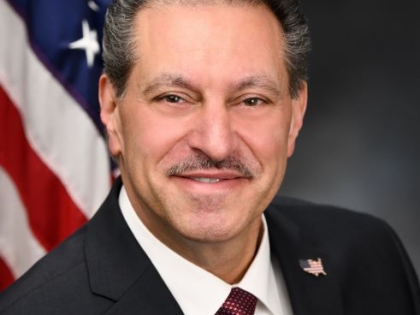
Addabbo Announces Passage of Bills Protecting Against Sex Offenders
Joseph P. Addabbo Jr
May 17, 2011
Bills Heighten Protections, Deal with Sex Offender Penalties, Registration, Employment
Queens, NY, May 13, 2011 - NYS Senator Joseph P. Addabbo, Jr., (D-Queens) announced that the New York State Senate recently passed a package of bills that strengthen the state’s criminal law to protect our children and youth from sexual abuse.
· S.1882 - Under current law, a criminal charge of sexual abuse in the 1st degree is applied when children under the age of 11 have been abused by individuals 18 and older. Meanwhile, pedophiles who sexually abuse a 12- or 13-year-old victim are charged with only a Class A misdemeanor, a penalty similar to someone who was guilty of stealing a pack of gum. This Senate bill will charge anyone guilty of abusing a child under the age of 13 with sexual abuse in the 1st degree, a class D felony that carries significantly harsher penalties which will keep pedophiles off the street.
“Current law is inconsistent and dangerous, especially in a world where 12- and 13-year-olds are using the same modes of communication as the most tech-savvy pedophiles,” said Senator Addabbo. “Those who would sexually abuse young teens must be held accountable to the fullest extent of the law, which our bill will guarantee.” The consequences faced under New York State criminal law for a person guilty of a class D felony is up to 7 years in prison, a punishment far more severe than the minimal 15 days to 1 year a person would face if convicted of a class A misdemeanor. The bill is awaiting action in the Assembly.
· S.3207 – Provides that a person is guilty of the crimes of aggravated sexual abuse in the 1st, 2nd or 3rd degree when the victim is under 13 years-old and the abuser is ages 18 or older. Section 1 amends the criminal law by adding a new provision to aggravated sexual abuse in the 3rd degree. Under the new provision, a person is guilty of the crime when he inserts a foreign object in the vagina, urethra, penis, or rectum of a child who is under 13 years-old, and the offender is 18 or older. Section 2 adds a new provision to aggravated sexual abuse in the 2nd degree to provide that a person is guilty of the crime when he inserts a finger in the vagina, urethra, penis, or rectum of a person under 13 and causes physical injury to that person and the actor is 18 or older. Section 3 adds a new provision to aggravated sexual abuse in the 1st degree to provide that a person is guilty of the crime when he inserts a foreign object in the vagina, urethra, penis, or rectum of another under 13 years-old and causes injury to that person and the actor is 18 or older. This act makes a similar change in the age threshold for the crimes of aggravated sexual assault in the 1st, 2nd and 3rd degree, as those made by the enactment of the Sexual Assault Reform Act of 2000 (SARA) for the crimes of rape or sodomy when the victim is under 13. This bill would take effect on the first of November after the date on which it becomes a law.
· S.1416 – Amends the criminal law and the correction law by establishing penalties for a convicted sex offender’s failure to provide a DNA sample in the 2nd degree (class A misdemeanor) and in the 1st degree (class E felony) and a sex offender’s failure to register or verify as a sex offender in the 2nd degree (class E felony) or in the 1st degree (class D felony), under the Sex Offender Registration Act (SORA). Failure to register is currently a correction law felony, but not a criminal law felony, so it does not constitute a predicate felony with regard to enhanced sentencing. Moving the offense of “failure to register” to the penal law would improve compliance with the important public safety initiative of SORA by making offenders who repeatedly refuse to comply with their sex offender obligations subject to enhanced sentences. Under Executive Law, certain crimes require the convicted to provide a DNA sample (including assault, homicide, sex offenses, escape or incest). The success of New York State’s DNA data bank depends on it being as complete as possible. However, many convicted criminals continue to flout the law and refuse to comply. Offenders are occasionally charged with obstructing governmental administration in the second degree, though this was not the law’s original intent. Several states have addressed this problem with statutes that provide a misdemeanor penalty or fines. Creating misdemeanor and felony offenses in New York for failure to register or to verify as a sex offender as well as for refusing or failing to provide a DNA sample would provide an incentive to comply with the current law. This bill would take effect on the first of November after the date on which it becomes a law.
· S.3325 – Amends the correction law in relation to sex offender registration, to help insure that sex offenders are held responsible for knowing what the state and local residency and employment laws are in the community and verifying in a statement that they are in compliance with them at time of registration. The current law requires verification of residency and employment but does not put the burden on the offenders of verifying that they are in compliance with state, county and local laws that regulate residency and employment. The State and localities have imposed numerous laws regulating where a sex offender can reside or work. This bill places the obligation on the offender of knowing those laws, complying with them and verifying their compliance. This act shall take effect on the 60th day after it becomes a law.
· S.1418 – Amends the correction law, in relation to prohibiting permissible employment, employment-related activities and volunteer activities that may be performed by sex offenders. Under the Sex Offender registration Act (SORA), convicted sex offenders are restricted from living in certain communities, but the law does not extend to limit where they can or cannot work in paid and unpaid circumstances. More specifically, existing state law does not prohibit convicted sex offenders from obtaining ‘unsupervised’ employment. Absent supervision in residential living quarters and assisted living quarters could potentially lead to a dangerous situation. This bill would prevent sex offenders from serving in managerial and supervisory roles in specific fields which the bill identifies as employment within residential living quarters, as a home health aide, and in assisted living facilities. It would take effect immediately.
Addabbo stated, “I am hopeful that these bills eventually become law in order to strengthen and improve the protection of individuals against sex offenders.”
# # #
Share this Article or Press Release
Newsroom
Go to NewsroomAddabbo Hosts Rain Barrel Giveaway
May 3, 2016

Addabbo Honors School Safety Agents
April 28, 2016
